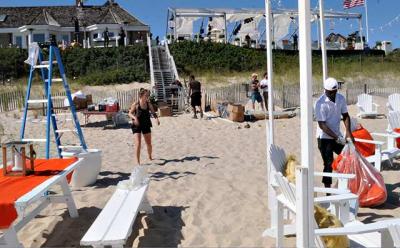East Hampton Village Talks Parties

The East Hampton Village Board considered expanding the requirements for large groups to obtain permits for events on public property, including beaches, at a work session last Thursday, focusing on litter and suggestions from the village beach manager and town trustees. The board also heard details of a request from the East Hampton Town and Village Disability Advisory Board for expedited review of permits for construction or renovations that would allow the disabled to remain in their houses.
Ed McDonald, the beach manager, had requested that all catered parties, regardless of size, be required to obtain a large-assembly permit, Richard Lawler told his colleagues. The village now requires a permit for assemblies of 50 or more people in which accumulated litter will exceed what is normally provided at the site and/or when parking will be on public roads or property.
Becky Molinaro, the village administrator, told the board that 19 of the 39 large-assembly permits issued for beach events this year were for catered parties. (The village issued 163 large-assembly permits this year.)
The board amended its code last year, adding a provision that such permits include a $250 security deposit. “Have we ever kept any of these?” asked Barbara Borsack, the deputy mayor, presiding in place of Mayor Paul F. Rickenbach Jr., who did not attend. No, Ms. Molinaro said, the deposit is for damage to village property.
“When you’re talking about a security deposit,” Linda Riley, the village attorney, told the board, “you’re going to have to quantify what they left and what it cost you” to remove. Bruce Siska asked if that cost could be calculated. “Couldn’t we come up with a number and bill them after the event, for however long it takes one of the guys to pick up all the garbage?” he asked.
Scott Fithian, the superintendent of public works, spoke up, saying he didn’t want the department to get involved in picking up party garbage. “How do you tell whose it is? That’s the dilemma now.” Large assemblies are already required to take refuse off the beach when the event is over, Ms. Borsack said. “The issue is if they don’t, how do we take some of that deposit and make use of that for the cleanup?”
It would be simpler to charge a flat fee, Ms. Molinaro said. But Ms. Borsack said a fee would serve as a disincentive. “If we charge a fee, they’ll say, ‘They’re charging us anyway, why should we take it away?’ ”
The board circled back to Mr. McDonald’s request that a large-assembly permit be required for all catered events. “The proposals are very fluid at this time, and will need more vetting,” Ms. Molinaro said in an email on Tuesday.
Mr. Lawler also spoke about the trustees’ request that balloons be banned on beaches, citing both litter and their danger to wildlife. He and his colleagues were amenable to the idea.
With regard to construction or renovation affecting the disabled, Ken Collum, the code enforcement officer and fire marshal, described a set of building practices known as universal design which allows municipalities to prioritize building permits for one and two-family houses that meet certain criteria to accommodate the disabled. “In other words,” he said, “we’d be able to put that permit at the head of the line. That’s the basic incentive.”
Building plans would have to accommodate the wheelchair-bound by including a first-floor bedroom, zero-step height to enter the structure, 34-inch interior doorways, and a 36-inch entry width, as well as 5 of 13 additional criteria including 17 to 19-inch-high toilets, adjustable handheld showerheads, and pull-out bases of kitchen cabinets.
“If we can make some accommodations on renovation and new construction,” Mr. Collum said, “I don’t think it’s going to be any burden on the Building Department. . . . I think it’s the right thing we should be doing. The community is getting older. If you want to stay in your home and are no longer as mobile as you used to be, this would enable you to stay in your home.”
Board members agreed.
